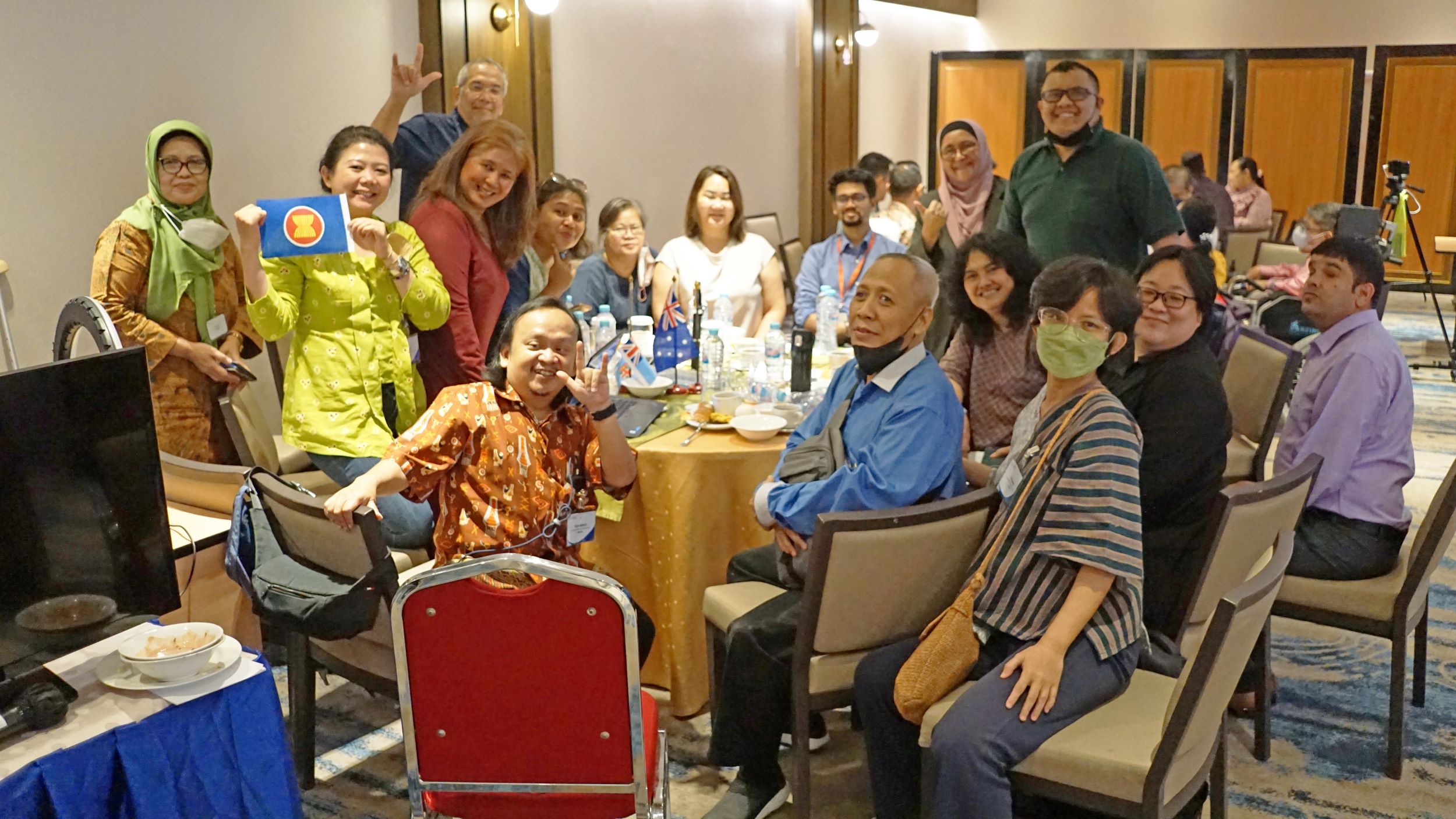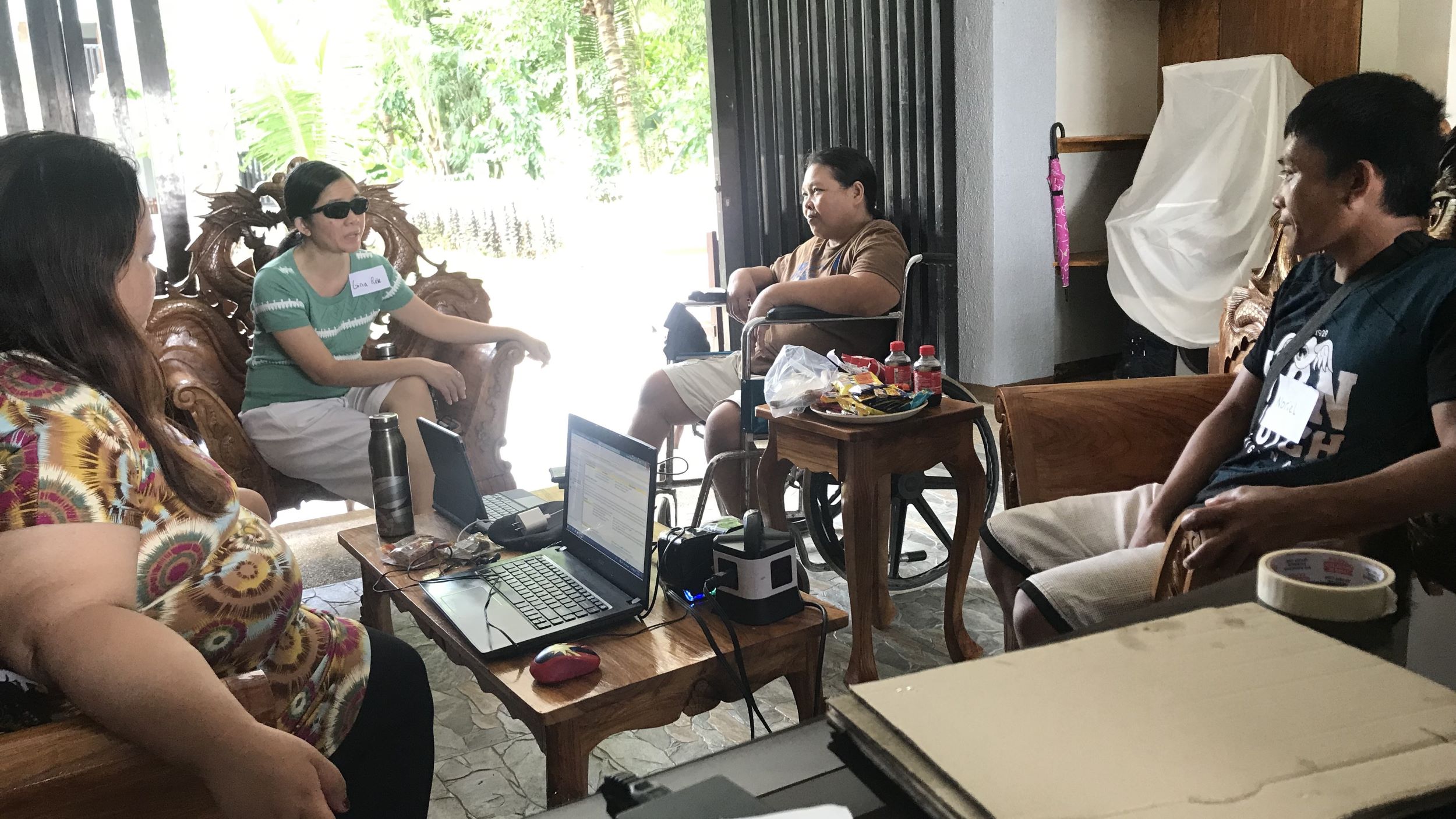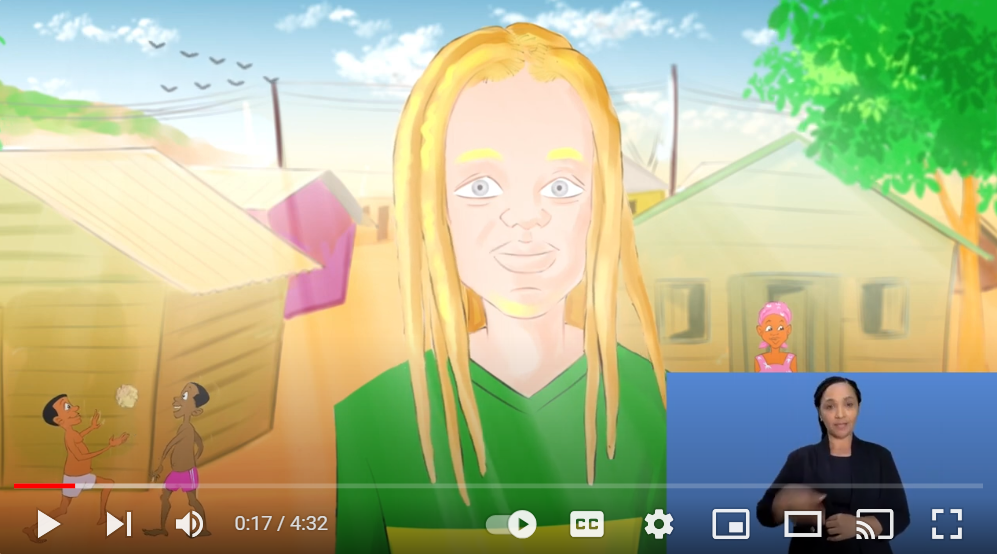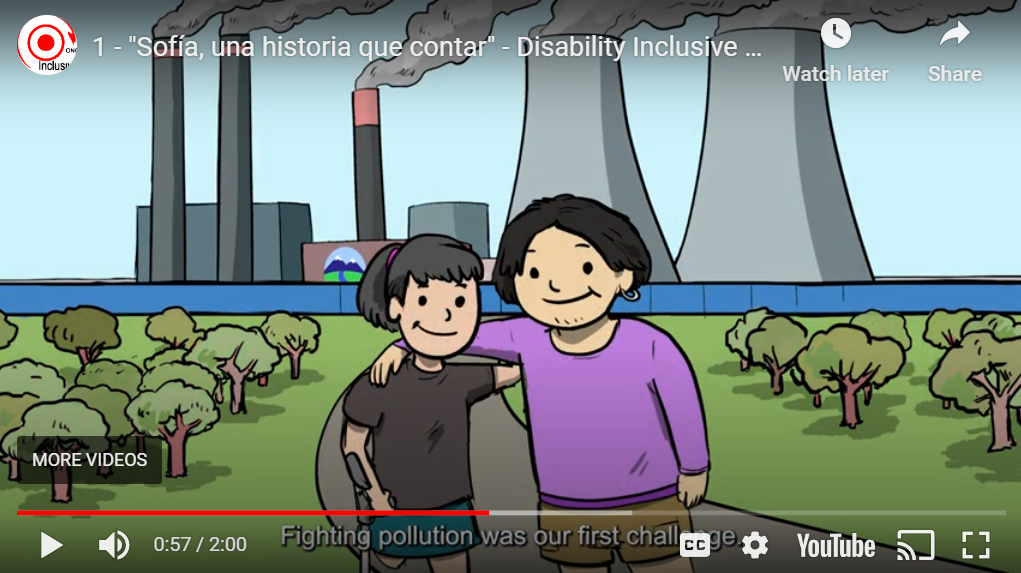The Disability Rights and Climate Justice (DRCJ) Advisory Board at Global Greengrants Fund is a global board founded in 2022 that encourages intersectional connections between disability rights and climate justice movements. In this blog series, we hear directly from those grantee partners, digging deeper into their contexts, their strategies for supporting disability rights and environmental justice, and their visions for a just world.
Article by Yolanda Muñoz, Disability Rights and Climate Justice Board Coordinator, and Marianne Menut, Disability Rights and Climate Justice Board Learning Coordinator

As climate action and environmental justice gradually become a priority in the disability rights and disability justice agenda, many individuals with disabilities face a major barrier: the information gap between disability justice and climate movements. Accessible information is vital to bridge climate and disability movements. Recognizing this, several of our Disability Rights and Climate Justice grantee partners have taken action. This blog highlights their projects, unpacks the impact eco-ableism and lack of accessible information have on persons with disabilities’ access to climate information, and uplifts persons with disabilities as powerful knowledge producers. Persons with disabilities must be centered in climate justice movements if we are to be truly effective in addressing the devastating impacts of climate change.
Here are a few grantee partners who are bridging the information gap:
- The UN Independent Expert on the Rights of Persons with Albinism, Ms. Muluka-Anne Miti-Drummond, worked with persons with disabilities to create an animated video on climate change and persons with albinism.
- Himpunan Wanita Disabilitas Indonesia (HWDI), which translates to Indonesian Association of Persons with Disabilities, produced a case study titled “Participation of Indigenous Disabled Communities in Natural Resource Management And Livelihood Adaptation Responses in the Context of Climate Change.”
- ONG Inclusiva from Chile produced a series of educational materials in Spanish and English about disability-inclusive environmental justice.
- Life Haven Center for Independent Living based in the Philippines produced a research paper on the impacts of climate change on persons with disabilities.
- The Manila Observatory in the Philippines partnered with the ASEAN Disability Forum to produce a report called “Climate Change and Persons With Disabilities in the ASEAN: A Review of Policy Gaps in the ASEAN.”
- The ASEAN Disability Forum produced a policy brief titled “Encouraging Social Inclusion and Disability Rights Principles on Climate Change Policy in Southeast Asia Countries.”

Eco-ableism
Climate change has disproportionate impacts on persons with disabilities. Grantee partner Life Haven conducted research on the livelihoods of and consequences of climate change on Indigenous persons with disabilities in Sando Batu and the Cenreanging Indigenous Community in the Philippines and found that climate change’s effects on local fisheries and agricultural systems lead to soaring food prices. This has exacerbated food insecurity for people with disabilities who already face high levels of unemployment.
Life Haven’s research illustrates an example of eco-ableism. Eco-ableism refers to “the marginalization of disabled people through environmental design; the exclusion of disabled people in environmental decision-making; and the discrimination against disabled people through environmental discourses, beliefs, and attitudes. It is also the privileging of typically abled bodies and minds through environmental design, practices, and discourses.”*
Life Haven’s research also found that eco-ableism takes the form in Sando Batu and the Cenreanging Indigenous Community in the Philippines of an information gap between disability and climate movements. Their research highlighted a lack of information on government programs and opportunities to address the economic struggles of persons with disabilities that the climate crisis exacerbates. The absence of accessible formats for this information compounds this issue, as most of the available information relies on ableist standards, such as long, text-heavy articles or academic studies. There is an urgent need for more, and accessible, information about the intersection between disability and the climate crisis in this region and globally.
Accessible Information is a Human Right
Despite growing access to information about climate change globally, the growth of accessible information on disability and climate justice is significantly slower. Access to Information, or the right to seek, receive, and impart information held by public bodies, is an integral part of the fundamental right of freedom of expression, as recognized by the Universal Declaration of Human Rights (1948). According to UNESCO, access to information is crucial for empowering individuals to make informed choices, hold governments accountable, and participate in decision-making processes affecting their lives.** However, for many persons with disabilities, the realization of this right remains a significant challenge, particularly for information about climate change. We’ve noticed a few key approaches our Disability Rights and Climate Justice grantee partners have taken to address this obstacle:
1. Attention to accessible formats
It is important to publish information in diverse formats that cater to different accessibility needs. The Manila Observatory and the HWDI, for example, opted to produce complex and extensive written reports to target a scientific and academic audience. To ensure accessibility, they made sure the reports were screen-reader-accessible, and that images were accompanied by alt-text to accommodate persons with visual disabilities. Other organizations opted for alternative formats. Last year, ONG Inclusiva produced a series of videos featuring subtitles and pamphlets that were accessible by screen readers on Disability-Inclusive Environmental Justice. Their accessible social media campaign reached over 150,000 people. The organization argues that these figures reflect a commitment among their communities to diversity, equity, and social responsibility, benefiting individuals, organizations, and society as a whole. Similarly, the UN Independent Expert on the Rights of Persons with Albinism produced a short animated video on the Impact of Climate Change on Persons with Albinism. The video includes audio description, sign language interpretation, and subtitles, thus accommodating a wide range of accessibility needs.
2. Easy-to-understand information
To dismantle ableist practices, last year’s grantee partners produced material that caters to different learning paces by presenting information at various levels of complexity. This type of knowledge production can benefit individuals with intellectual disabilities and those with different levels of education, literacy, and fluency. For example, storytelling can be a powerful tool to convey complex information in an accessible and engaging manner, as demonstrated by the video the UN Independent Expert on the Rights of Persons with Albinism created.
“I am a strong believer in the power of storytelling to illustrate a greater concern and I think having something audio-visual appeals to a wider range of individuals. It provides an accessible, more interesting summary of the report and directs others to where they can obtain more information.” —UN Independent Expert on the Rights of Persons with Albinism
It is important to note, however, that content should correspond to its intended audience. If a piece of information is meant for adults, one should not use infantilizing vocabulary. A key way to ensure that a piece is adequate for its audience is to include persons with disabilities in the writing and reviewing processes.
3. Variety of languages
Linguistic diversity is key in fostering inclusive and diverse climate movements. However, much of the knowledge at the international level is produced in English. Climate change and disability are global topics, and therefore information about them must exist in a wide variety of languages to reach people around the globe. Publishing information in multiple languages, as HDWI did by producing a case study in Indonesian and English, can enhance accessibility for both information receivers and producers. Additionally, knowledge producers should pay particular attention to incorporating underrepresented languages, such as sign language or braille. The UN Independent Expert on the Rights of Persons with Albinism’s video, for example, featured interpretation into ISL, which helped to expand accessibility.
“It is essential for all to know the concerns regarding climate change, how they can mitigate the impact to themselves, and what role they might be able to play in policy development.” —UN Independent Expert on the Rights of Persons with Albinism

People with Disabilities as Knowledge Producers: Shifting the Paradigm
The experiences of persons with disabilities are diverse. Disabled persons can be women, two-spirit, Black, wheelchair users with autism, wealthy, educated, parents, undocumented, etc. Disability exists in myriad forms and intersects with other identities. Amplifying expressions of these unique perspectives strengthens climate movements. It sheds light on overlooked issues and suggests new ways of experiencing, adapting to, and mitigating the climate crisis. For instance, HWDI produced a case study of the Disabled Indigenous Community of Cendreanging, located in the administrative regions of Maddenra Village and Bina Baru Village, Kulo District in the Philippines. This research adopts an intersectional lens to explore the relationships between natural resources management, indigeneity, gender, and disability.
“By involving Indigenous women with disabilities as respondents, we get direct stories from Indigenous women with disabilities in the community about their experiences in society and managing natural resources. Meanwhile, the research can provide data and information about the Participation of Indigenous Peoples with Disabilities in Natural Resource Management and Livelihood Adaptation Responses in the Context of Climate Change, and become tools for advocating for Indigenous women with disabilities, Indigenous people with disabilities, and climate change from Village Levels, District Levels, Provincial Levels, and National Levels.” —Himpunan Wanita Disabilitas Indonesia (HWDI)
“It is essential to hear from those with lived experiences who have a unique perspective to bring to knowledge production. They bring a practical understanding to situations, rather than just theoretical. Their perspective and insights can illuminate aspects that may be overlooked by our current awareness.” —UN Independent Expert on the Rights of Persons with Albinism
But mere representation is not enough. Individuals with disabilities must also be part of research and information production processes to overturn the societal belief that they are solely passive recipients of help. The philanthropy sector has historically financed solutions to “cure” disability,*** based on the “medical” model of disability which posits that disability is a condition that can and should be cured. As stated in Article 30 of the Convention on the Rights of Persons with Disabilities, ‘States Parties shall take appropriate measures to enable persons with disabilities to have the opportunity to develop and utilize their creative, artistic, and intellectual potential, not only for their own benefit but also for the enrichment of society”.**** Global Greengrants, therefore, encourages the funding of disability-led projects. Despite years of exclusion, persons with disabilities continuously prove that they can be visionary catalysts of change. In their disability-led projects, HWDI and ONG Inclusiva confirmed that persons with disabilities are capable of producing compelling pieces of information that respond to the needs and demands of disabled individuals and communities. This creates a more inclusive world not just for persons with disabilities, but for everyone.
“Producing knowledge allows us, individuals with disabilities, to express ourselves, advocate for our rights, and challenge stereotypes and misconceptions. It empowers us to participate actively in shaping policies and practices that affect our lives.” —ONG INCLUSIVA

Advocacy and Collaboration Across Movements
“Persons with disabilities often encounter barriers to accessing information and resources. By producing our own knowledge, we can address these gaps and develop solutions that are specifically tailored to our needs and challenges, leading to the exchange of ideas, support, and collaboration. Nothing about us without us.” —ONG INCLUSIVA
Knowledge production is key to effective advocacy. All of the projects highlighted in this blog inform their audience about the intersections of climate change and disability, thus providing solid arguments and credibility to persons with disabilities advocating for more inclusive climate policies and movements. For example, thanks to their research, Life Haven members had the opportunity to participate in COP28 and work with youth and gender constituencies, the Global Disability Caucus, and the Philippine government, while using their results to advocate for disability rights. Life Haven’s research case studies were also used by other organizations such as Greenpeace and the CDP (Center for Disaster Preparedness) to lobby for climate justice.
Similarly, the Manila Observatory, an environmental organization that had never worked on disability before, approached the topic for the first time by collaborating with the ASEAN Disability Forum. The latter organized a workshop that allowed representatives from ASEAN countries to better account for persons with disabilities within their own policy system. This workshop steered the Manila Observatory’s work, allowing them to understand that inaccessible infrastructures were a major concern in climate contingency systems for most ASEAN countries. In their policy brief, they explain that the absence of tactile walking surface indicators (TWSI), color signage, and railways prevents persons with visual impairments from navigating across roads or pavements independently. Similarly, the absence of ramps or elevators also means people with limited mobility do not have full travel accessibility. These everyday issues are further amplified during climatic disaster evacuation, when persons with disabilities are unable to perceive any visual signals and cues as to where to go for refuge and evacuation or are unable to utilize stairway evacuation facilities. Their policy brief is the basis for a solid advocacy strategy at the regional level. Thus, building bridges among movements leads to well-informed advocacy initiatives at every level.
By creating knowledge by and for persons with disabilities, Global Greengrants Fund grantees address a variety of environmental justice and disability rights concerns. HWDI, the UN Independent Expert on the Rights of Persons With Albinism, Life Haven Center for Independent Living, the ASEAN Disability Forum, and ONG Inclusiva respond to the disability community’s climate change needs. Persons with disabilities and their organizations are committed to producing effective networks and strategic pieces of information. Their work sheds light on the creativity, resilience, and strength of the community. Access to information is a right and a lack thereof hinders persons with disabilities’ participation in climate movements. Global Greengrants Fund therefore encourages knowledge-production projects on the intersection of disability and environmental justice.
Useful Links:
- Producing easy-to-understand information: https://www.inclusion-europe.eu/easy-to-read-standards-guidelines/
- Accessibility for social media guidelines: https://disabilityrightsfund.org/wp-content/uploads/Accessibility-for-Social-Media-Guidelines.pdf
- Video Accessibility https://www.notion.so/cluaglobal/Video-Accessibility-87c34ea13b0c4a01b595be5254f1526c?pvs=4
Footnotes:
* Cram, Ellen, Martin P. Law, and Phaedra C. Pezzulla. 2022. “Cripping Environmental Communication: A review of Eco-Ableism, Eco-Normativity, and Climate Justice Futurities.”
*** https://ssir.org/pdf/Supp-Winter-2022-Philanthropy-Ableism.pdf
